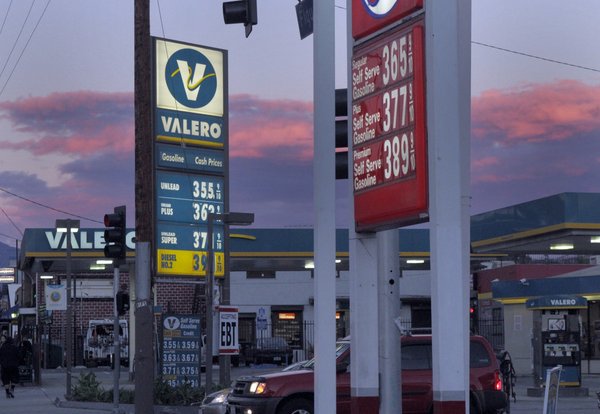Put That In Your Tank and Smoke It
Legal Planet: Environmental Law and Policy 2013-01-03
The next time anyone tells you that an increase in gasoline prices (say, as part of a carbon-tax or a cap-and-trade system) would generate unbearable costs to consumers, think again. The Los Angeles Times reports something that I have often seen but never really thought through: gasoline stations often a couple block away from each other have radically different prices:
Known in the industry as zone pricing, the controversial practice was apparent one afternoon when Culver City resident Michael Denis, on a jaunt to downtown Los Angeles, stopped at a Chevron station to feed his Fiat 500 some gasoline at $4.69 a gallon.
About four miles away, Lupe Alfaro was filling her Toyota Camry with Chevron gasoline but was paying $3.89 a gallon.
The two motorists were buying the same grade of gasoline, which more than likely came from the same refinery in El Segundo. Yet the prices they paid differed by 80 cents a gallon, or by more than $10 to fill an average 13-gallon tank.
I can confirm this in my own Westside neighborhood. Today I drove down San Vicente Boulevard in Brentwood and found: Conserv Fuel at $3.59; Chevron at $3.75; Union 76 at $4.39; and Exxon/Mobil at $4.59 — all within one mile of each other.
The Times says that this disparity stems from two things: 1) “zone pricing”, in which refiners sell at different prices to different stations “based on a host of closely guarded factors, such as nearby competition, traffic volume and station amenities”; and 2) consumer preferences for different gasoline brands and station characteristics.
Consider me highly skeptical. The Times reports concedes that these policies are unheard of in just about every other retail business, and I see no reason why shoppers are more brand picky about gasoline than in any other retail product; if anything, they are probably less so.
Instead, there are two more feasible explanations in my view. First, this could be a method of price-fixing among refiners. At the very least, this should something that the California Attorney General should look at quite carefully.
Second, it might simply be another example of competition not working very well to reduce prices. Consumers in convenience-type areas just don’t do much comparison shopping. That’s their right, of course, but let’s not say that the Magic Of The Marketplace will automatically create lower prices for all.
In any event, let’s repeat the moral of the story at the beginning of the post: the next time someone tells you about the disaster that a carbon tax would create because it would raise the price of gasoline, you are allowed to tell them to stuff it.
